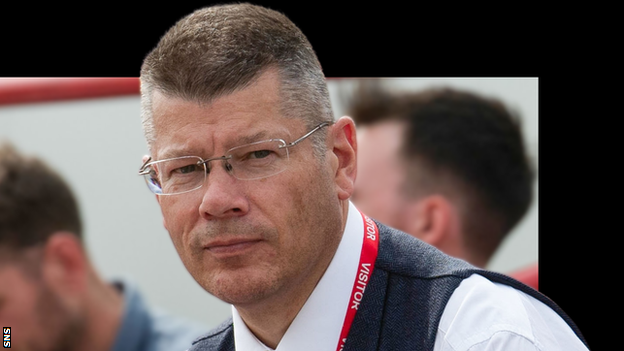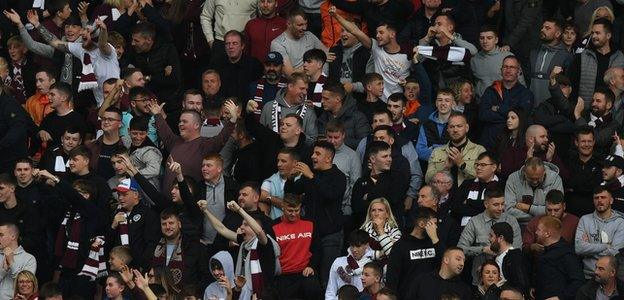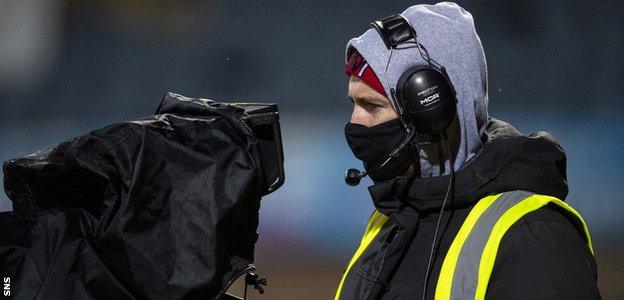Q&A - Neil Doncaster on SPFL's new £150m broadcasting deal with Sky Sports
- Published

Neil Doncaster says there's a balance to be struck between live TV games and supporters attending matches
The SPFL's new £150m live broadcasting contract is a "great deal" for Scottish football, says chief executive Neil Doncaster.
The new agreement with Sky Sports for the period 2025-2029 will continue the league's exclusive Scottish Premiership rights arrangement with the commercial broadcaster, who have shown top-flight games since 2009 and exclusively since 2020.
As well as an increase in Premiership games shown live from 2025, Sky will also show SWPL matches from the current season onwards.
BBC Scotland's Chris McLaughlin conducted a question and answer session with SPFL chief executive Neil Doncaster about the new deal.
Neil Doncaster: We're delighted to have seven years of security with the UK's premier sports broadcaster, on improved terms and a record deal for Scottish league football, with the flexibility of clubs being able to provide pay-per-view and with additional games on Sky Sports.
What are the financial implications?
ND: You'll understand that I can't go into the commercial details but certainly we can confirm that it's a record-breaking deal. By value, it's the single biggest deal in the history of Scottish league football. It will make a material difference to the financial futures of all 42 SPFL clubs, and of course SWPL clubs as well. In fact, I think it's transformative in the finances of the women's league.
What difference will this make to the fans?
ND: Well they'll see more games on Sky Sports, for a start - going up from 48 to 60 games, initially, with the potential to take it up to 80 games. But I think it's all about balance. I think part of the debate about balance has been lost over the past few days with certain commentators talking about streaming all games live. I don't think there's any desire from clubs to have all games streamed live.

Neil Doncaster says there's a balance to be struck between live TV games and matches that can only be viewed live in person
There's a desire to have a balance and that means the very best games shown live on Sky Sports, a number of other games being available on PPV and the others where you have to be in the stadiums to see them. I think getting that balance with those three elements is crucial. That's the reason why we have the highest per capita attendance anywhere in Europe. That was all recognised by 41 of the 42 clubs so there was an overwhelming view that this was the right thing to have done.
Overwhelming but not unanimous. Rangers have been very public about their opposition to this deal, why do you think they have been so opposed to this?
ND: It's not for me to speculate about people's motives in relation to this contract. Forty-one of the 42 clubs have endorsed this process - that's an overwhelming endorsement of where we've got to. You have to remember you have very experienced, heavyweight businessmen like Ron Gordon who has been a key architect of this deal. Dave Cormack, Mark Ogren, John Nelms, Andrew McKinley, you know all of them kicking off the process in terms of the review that was carried out. That allowed Ron and myself to sit down with Sky. These are big serious people who understand what it is to negotiate a broadcast deal.
One of the biggest criticisms is that you didn't take this to market.
ND: But I don't understand that criticism at all. We sat round the boardroom table with the 12 Cinch Premiership clubs. We went through the process - we clearly had a broadcast advisor on board. We have done market testing, we know what the market is and we know who is interested.
So why not properly take it to market then, if you know these things anyway?
ND: We have taken it to market. We've spoken to potential buyers of Scottish football. We know what the attitude is and ultimately Sky Sports stepped forward and they were the ones that made this offer.
Would it not have been wiser, to avoid criticism from clubs like Rangers, to just go through the process?
ND: We did go through a process. We've spoken to these other potential bidders and I think suggestions otherwise are absolutely wide of the mark and I genuinely don't understand why there's a feeling out there that we didn't.

Clubs can offer a pay-per-view service under the new deal
The figure that has been widely reported to distribute between the clubs is £30m per season. Other leagues of a similar size get more - and that is one of the other criticisms, that you have undervalued the product.
ND: Once again, I don't understand that criticism. Ultimately our game is based largely on the in-stadia experience. It's based on the passion, the drama and the excitement. Showcasing the very best games live on Sky Sports and having others where fans have to be in the stadium. That's what fans want and it's what clubs want. Per game, this dwarves some of the deals that we see around Europe.
What about the likes of Denmark and Portugal?
ND: Absolutely, I don't know what the Portuguese get per game but certainly in terms of second tier leagues around Europe, our league can absolutely hold its head high in terms of the amount we get per game. Other leagues around Europe are largely broadcast products, where every game is shown live, but we wanted to get the balance between fan experience and the broadcasting the very best matches.
How frustrating is it not to have a club the size of Rangers on board with this?
ND: I'm not going to go into specifics about how individual clubs regard the deal.
Aberdeen chairman Dave Cormack said recently it was important to get this deal done but also that the league mends its relationship with Rangers, which was seriously damaged over the cinch deal. Do you agree?
ND: I think we would always like the idea of all 42 clubs pointing in the same direction - it makes our job much easier if that is the case, but we won't be deflected from what we are here to do, which is to look after the interests of all 42 member clubs.